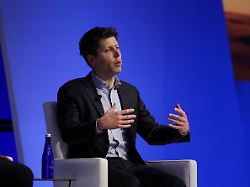Up to seven trillion dollars
OpenAI boss Altman is drumming up support for the giga-chip offensive
February 9, 2024, 7:02 p.m
Listen to article
This audio version was artificially generated. More info | Send feedback
Megalomaniac or visionary? According to insiders, OpenAI boss Altman is cleaning doors around the world to revolutionize the chip market. Trillions of dollars are to be used to build factories in which the crucial processors for AI applications are manufactured. The Emirates are apparently at the center of his efforts.
OpenAI boss Sam Altman apparently wants to transform the global semiconductor industry. According to insiders, he is in talks with investors, including the government of the United Arab Emirates, to raise funds for a very ambitious technology initiative. The money will be used to increase global chip manufacturing capacity and expand the ability to use AI. The cost of the project is estimated at several trillion dollars – specifically, between five trillion and seven trillion dollars could be needed, said one of the informants.
The money is intended to enable the growth of OpenAI and eliminate the shortage of expensive AI chips. Altman has often complained that there aren’t enough such chips – known as graphics processing units (GPUs) – to support OpenAI’s pursuit of artificial intelligence.
Such an investment amount would dwarf the current size of the global semiconductor industry. Global chip sales were $527 billion last year and are expected to rise to $1 trillion annually by 2030. Global sales of semiconductor manufacturing equipment – the expensive machinery needed to run chip factories – hit $100 billion last year, according to an estimate by industry group Semi.
The amounts cited by Altman would also be unimaginably high by corporate fundraising standards – higher than the national debt of some major global economies. According to the Securities Industry and Financial Markets Association, a total of $1.44 trillion in corporate bonds was issued in the U.S. last year. The combined market capitalization of Microsoft and Apple, the two most highly valued companies in the United States, is about $6 trillion.
US government is informed
Achieving his ambitious plans for chips and other areas needed to support AI would require convincing a complex, global network of donors, industry partners and governments – including buy-in from the US, for which the semiconductor industry is a strategic priority . Altman met with U.S. Commerce Secretary Gina Raimondo and discussed the initiative, according to people familiar with the matter.
“OpenAI has had productive discussions about expanding the global infrastructure and supply chains for chips, energy and data centers that are critical to AI and other industries that rely on it,” said an OpenAI spokeswoman. “We will continue to keep the U.S. government informed given its importance to national priorities and look forward to sharing more details at a later date.”
Initial discussions with companies
As part of the talks, Altman is proposing a partnership between OpenAI, various investors, chip makers and utilities that would jointly raise money to build so-called chip foundries that would then be run by existing chip makers, it said. OpenAI would agree to be a major customer of the new factories. Discussions are still in the early stages, the full list of potential investors is not known, and the effort could drag on for years and ultimately be unsuccessful.
Altman was said to have met, among others, with Sheikh Tahnoun bin Zayed al Nahyan from the United Arab Emirates, with Masayoshi Son, the head of Softbank, and with representatives of chip factories such as Taiwan Semiconductor Manufacturing Co. (TSMC). project to discuss.
OpenAI has so far developed its AI technology using the computing resources of its partner Microsoft. Microsoft is aware of and supports OpenAI’s efforts to raise funds to expand chip capacity. The plans were discussed with Microsoft boss Satya Nadella and Chief Technology Officer Kevin Scott.
